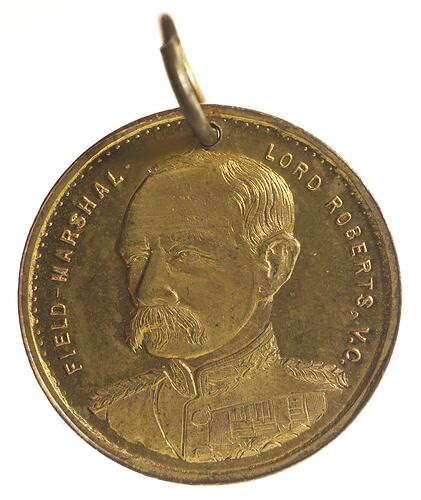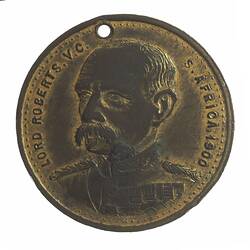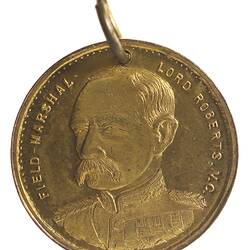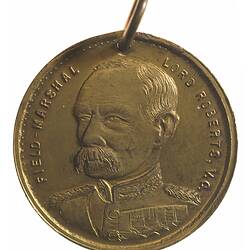Frederick Sleigh Roberts was born on 30 September 1832 in Cawnpore, India. From a privileged colonial background, he was sent to England to be educated at Eton, Sandhurst and Addiscombe. He obtained a commission in the Bengal Artillery in 1851, and the following year was posted to a field battery at Peshawar, where he also acted as aide-de-camp to his father, who commanded the Peshawar division. In 1856 Roberts was appointed to the Quartermaster-General's department of the staff, in which he remained for 22 years, advancing through the ranks until he became Quartermaster-General in India.
Roberts first drew attention to himself during the brutal suppression of the Indian Mutiny in 1857-58, and was awarded the Victoria Cross for his bravery. He was wounded, and returned to England, where in 1859 he married Nora Bews. He returned to India, and was entrusted with the organization of the Viceroy's camps during the progresses through India in 1860 and 1861. In 1863 he took part in the Umbeyla campaign among the mountains to the north of Peshawar. As the decades progressed his military prestige increased, so much so that he made the arrangements for the great durbar at Delhi in 1877, when Queen Victoria was proclaimed Empress of India. He spread his colonial wings and fought in Afghanistan, scoring the decisive victory of the Second Afghan War by defeating Ayub Khan's Afghan Army near Qandahar. In 1881 he was appointed governor of Natal and Commander-in-Chief in South Africa. He arrived to find that peace had broken out, and that his services were not required. He returned to India.
From 1885 to 1893 Roberts was commander-in-chief in India. As the second British commander-in-chief (December 1899-November 1900) in the South African War, he finally brought victory to Britain; captured Bloemfontein, capital of the Orange Free State Republic (March 13, 1900) and annexed that Boer state as the Orange River Colony (May 24); took the cities of Johannesburg (May 31) and Pretoria (June 5); and defeated Boer commandos at Bergendal (August 27). In 1895 he was appointed field marshal. After the disastrous actions in the war in South Africa in December 1899 at Magersfontein, Stormberg and Colenso, where his son was killed, Roberts was appointed commander-in-chief. He organised the Relief of Mafeking, achieved on 17 May 1900. Roberts then handed over the command to Lord Kitchener and returned to England to fill the office of commander-in-chief of the British Army, succeeding Lord Wolseley. He was the last commander-in-chief of the Army, serving until 1904 - the office was then abolished.
Roberts was created a baron in 1892 and an earl and viscount in 1901. Both of his sons having predeceased him, the barony became extinct, but the earldom and viscounty devolved through his daughters. Roberts died of pneumonia on 14 November 1914 in Saint-Omer, France, while inspecting Indian troops fighting at the front, of which he was colonel-in-chief.
References:
Encyclopaedia Britannica, 11th Edition, 1910-1911.
Britannica Online, quoted on http://www.pinetreeweb.com/roberts-bio.htm, accessed 5/2/2004.
More Information
-
Keywords
-
Localities
-
Authors
-
Article types



